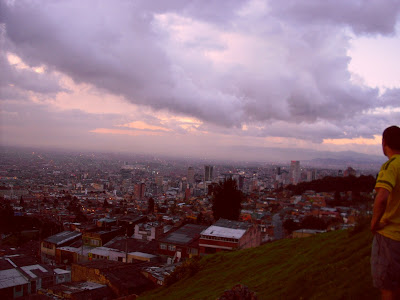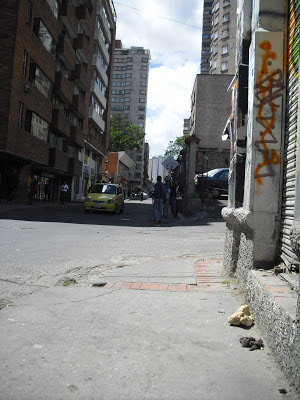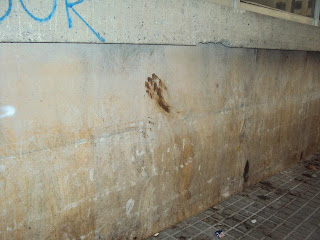As has been well documented, the Wrong Way crew is a modest bunch. Sometimes, though, we have to go against our natural instincts and give ourselves a modicum of praise (it’s unlikely anyone else will).
So as we prepare to depart Bogotá for what at this remove is an unspecified period of time, we’re going to take a look at some of, ahem, our achievements in the region over the last 20-plus months.*
Peace talks
Considering the bridges we built during our time living in divided Belfast (a nice little chat with the Reverend Ian Paisley outside City Hall being one of the highlights), it was only a matter of time before President Juan Manuel Santos called on us to set the Colombian peace process in motion.
 |
| The sun is setting on this latest (but perhaps not last) stint in Bogotá. |
Peace talks
Considering the bridges we built during our time living in divided Belfast (a nice little chat with the Reverend Ian Paisley outside City Hall being one of the highlights), it was only a matter of time before President Juan Manuel Santos called on us to set the Colombian peace process in motion.
Cynics out there may say that the whole thing is just an expensive talking shop that’s going nowhere – the violence hasn’t stopped, for one – but at least they’re talking, right? (For an earlier account of this, see http://bit.ly/13IIUKr).
‘Revitalised’ Bogotá
Where do we start with this? There’s the partially pedestrianised Carrera Séptima (7th Street) in the capital’s centre – a rare victory for humans over vehicles (kind of).
‘Revitalised’ Bogotá
Where do we start with this? There’s the partially pedestrianised Carrera Séptima (7th Street) in the capital’s centre – a rare victory for humans over vehicles (kind of).
We stood shoulder-to-shoulder with Mayor Gustavo Petro during the controversial change in rubbish collection that has revolutionised waste collection in the city (well, maybe not quite revolutionised, but it sounds good – for background see http://bit.ly/WFOPsW).
What's more, we finally initialised the programme to rescue the metropolis’ overworked horses – it’s taking time to get them all off the streets, but we’re getting there (see http://bit.ly/15IZQPz).
It’s not only the equines we’ve saved but also some human beings. Our cleaning up of Bogotá’s notorious Bronx barrio (and other dangerous barrios in other cities across Colombia) has been a roaring success – we just haven’t been there in a while to check on progress (it’s too dangerous).
 |
| Carrera Septima –take away the cars & the people will come (and march). |
Transport matters
An ever-extending (it goes to the airport now, almost) efficient (at times) Transmilenio service linked up with an integrated public bus system (SITP – OK, hardly anybody uses it yet and its operation is divvied up between nine companies, but change takes time, you know) is something we’re pretty proud of.
We’re not resting on our laurels, though. Metro Bogotá is more than just a pipe dream, it is on the way, trust us. (For more on transport in the city, check out http://bit.ly/N68gKL)
La grande
For some reason, the big beer revolution that swept through the rest of South America some time back passed over Colombia. That was until we arrived and got Bavaria – the country’s main beer producer – moving on this front.
La grande
 |
| Las grandes in our favourite tienda ... |
Since the introduction of La grande (750ml bottle), through hard work, dedication and repetition, we’ve been persuading the locals to take up the ‘big’ habit. Come on guys, above all it makes economical sense.
Vamos a Brazil
There’s no doubt Colombia has produced some exceptional football (soccer, if you will) players through the ages, but La Selección – the national team – has very often flattered to deceive. Thanks to our, um, support that has all changed.
Vamos a Brazil
There’s no doubt Colombia has produced some exceptional football (soccer, if you will) players through the ages, but La Selección – the national team – has very often flattered to deceive. Thanks to our, um, support that has all changed.
All they need is a couple of points from their final four games of the South American World Cup qualifiers and the Los Cafeteros will be on their way to Brazil next year – their first World Cup finals appearance since 1998. Chévere.
Thespian talent
Before our arrival, Colombian telenovelas (soap operas) were renowned for their cheesiness, terrible acting, ridiculous storylines and just all-round bad quality.
Thespian talent
Before our arrival, Colombian telenovelas (soap operas) were renowned for their cheesiness, terrible acting, ridiculous storylines and just all-round bad quality.
Now, however, with our help, they are, well, um ... Right, let’s just say we did some interesting extras work from time to time. The gory details of those can be found here http://bit.ly/NrbPc3.
Educating excellence
While we may have occasionally showcased our acting skills on Colombia’s small screen, the arguably more lasting, beneficial legacy we’ll leave behind has been our ability to pass on the English language – with an Irish twist albeit (more detailed thoughts on our teaching talents can be read here http://bit.ly/V8ELH4).
 |
| Hard at it; but whose is that banana skin? |
Educating excellence
While we may have occasionally showcased our acting skills on Colombia’s small screen, the arguably more lasting, beneficial legacy we’ll leave behind has been our ability to pass on the English language – with an Irish twist albeit (more detailed thoughts on our teaching talents can be read here http://bit.ly/V8ELH4).
Whether any of our alumni actually learned anything is open to debate. At the very least, though, some of them have a better understanding of Irish history and culture, Wrong Way style.
We'll miss imparting that knowledge; as well as all the free coffees and the odd free lunch. Heck, those latter treats are enough to entice us back (we're easily pleased here, you know). Time will tell on that one.
*Disclaimer: We would like to point out that some of these achievements may not be directly attributed to us. But ...
*Disclaimer: We would like to point out that some of these achievements may not be directly attributed to us. But ...



